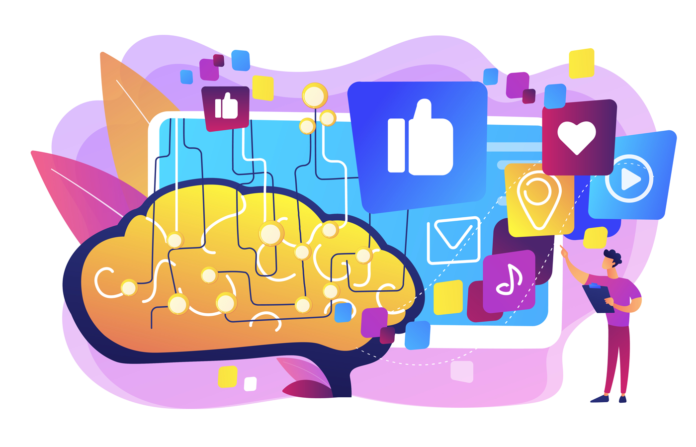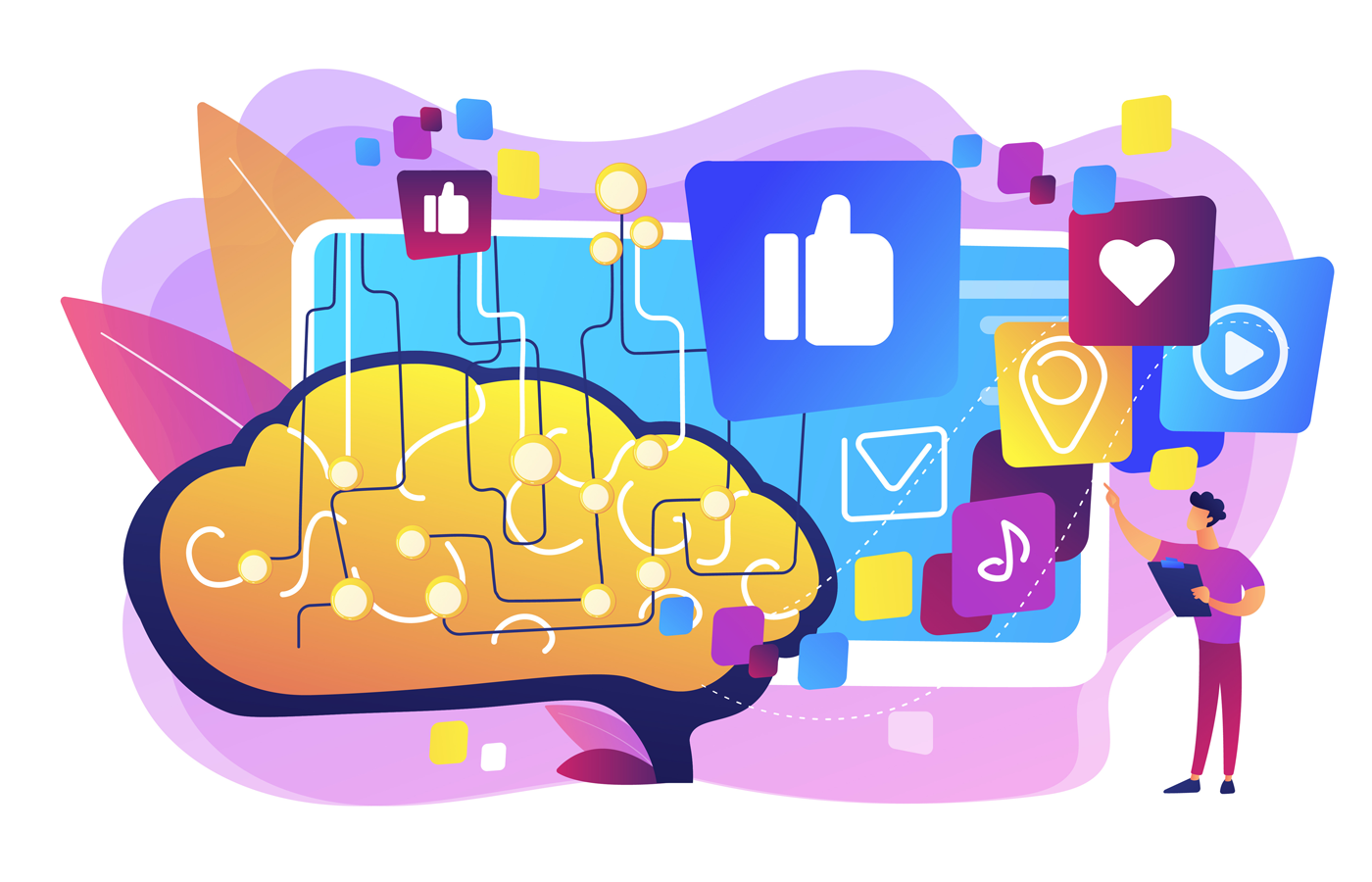 Image: Visual Generation/Adobe Stock
Image: Visual Generation/Adobe Stock
Artificial intelligence is having a dramatic impact on how businesses handle their social media accounts, giving them new tools to understand their audience behavior through social listening and respond to their interests with content creation.
The evolving technology means most companies are now using AI tools in social media to make better marketing and business decisions that help keep their customers engaged with their brands. However, AI is not a silver bullet—it still takes strategy, refinement, and human intervention. Here’s what you need to know about how to successfully use AI in social media.
What Is AI in Social Media?
AI has had a significant impact on social media by enabling AI tools to analyze customer behavior and tailor content based on those results to optimize marketing campaigns. AI systems evaluate large amounts of user data to forecast preferences and recommend personalized content, increasing user engagement and brand trust. AI can also help by suggesting relevant content ideas and best times to post it, analyzing audience demographics, and gauging audience sentiment.
Companies can take advantage of AI’s targeted advertising, predictive analytics, customer service chatbots, and social listening to help them track brand mentions. Data gathered with these AI-powered tools can also provide a better customer experience by presenting them with relevant information with which they’re more likely to interact.
However, the implementation of AI in social media raises ethical concerns, including privacy issues. There needs to be a balance between personalized experiences and user data privacy protection. Businesses must keep customers aware of AI’s impact on their social media experiences and guarantee that their information is safe.
Examples of AI Usage in Social Media
Integrating AI into social media management simplifies procedures and improves user experiences. Businesses that use AI’s capabilities are more efficient and get better audience engagement, resulting in a stronger and more dynamic online presence. There are a number of ways to implement this technology.
Writing Social Media Post Captions
Caption generation saves social media managers time by allowing them to more easily create interesting content, facilitating a more consistent publishing schedule. Companies can improve brand impression and increase engagement rates by personalizing captions to their target audience, making production easier and guaranteeing that content is maximized for audience engagement.
Creating Posts from Existing Content
Using AI to automatically create posts from existing content lets organizations repurpose their content more effectively by generating fresh social media content without having to start from scratch by reusing previous blog posts, articles, or images. Consistent publishing helps to maintain an active social media presence and encourages audience interaction.
Generating Video and Images
Tools to create eye-catching photos and AI-generated video can help organizations maintain a consistent visual brand across multiple social media channels. These tools convert raw materials into professional-grade images that pique interest and promote interaction. Short, dynamic video snippets in particular are extremely effective at capturing user attention, resulting in increased user engagement and traffic to the brand’s website or product pages. This visual uniformity strengthens brand identity and draws new followers.
Performing Sentiment Analysis
Sentiment analysis allows marketers to more precisely comprehend user attitudes about their brand. By assessing comments and social media posts, companies can respond more quickly to positive feedback and intervene in the case of negative feedback. Personalized responses help increase consumer satisfaction and brand loyalty, demonstrating that the brand appreciates customer opinions and is committed to offering outstanding service.
Optimizing Posting Schedules
Identifying the optimum times to post on social media based on user activity data helps ensure that information will reach target audiences when they are most active. Businesses can increase exposure and engagement by properly scheduling postings, which leads to increased interaction rates. This optimization enhances the likelihood of material being liked, shared, and commented on, resulting in increased traffic and improved overall social media performance.
Predicting Viral Content Potential
AI can predict which posts are likely to go viral based on previous data and content characteristics, enabling organizations to concentrate their efforts on marketing high-impact content. Viral content produces organic reach and dramatically increases brand recognition, giving businesses the potential to obtain global attention without incurring additional resources. This predictive power aids in the development and execution of effective social media initiatives.
Managing Social Media Ads
AI can help with the design, targeting, and optimization of social media advertising, reducing the cost of campaigns. Predictive algorithms assist in allocating funds efficiently, optimizing return on investment. Businesses can target the correct audience with little ad expenditure, ensuring that every advertising dollar is spent effectively. This accuracy in ad management enables firms to attract and convert more potential clients.
Finding and Generating Influencers
AI influencer search tools are transforming social media marketing by more quickly discovering influencers whose followings match brands’ target audiences. This accuracy improves the odds of a successful campaign. AI-generated influencers provide a distinctive twist, enabling marketers to experiment with innovative campaigns and create memorable experiences—these virtual influencers may be tailored to match the brand’s values and message properly, ensuring consistency and control that actual influencers may not provide.
Automating Content Curation
Because sentiment analysis identifies user behavior and preferences, algorithms can tailor content feeds to ensure consumers get posts most relevant to their interests. Articles and videos can be offered based on previous interactions, increasing engagement.
Monitoring Real-Time Trends
AI can watch and analyze real-time data to detect developing trends and popular subjects, informing social media platforms and advertisers. Opinion analysis of posts and comments can be used to measure public opinion and mood, aiding in proactive crisis management. Identifying spikes in unfavorable sentiment allows for early diagnosis of possible public relations difficulties.
3 Use Cases of Brands Using AI in Social Media
As AI continues to transform the social media environment, bringing new opportunities for companies and users alike, companies like Heinz, Sephora, and RayBan are finding creative ways to implement it into their social media efforts.
Heinz A.I Ketchup
Ketchup company Heinz took a creative leap by incorporating AI into a marketing campaign, using AI text-to-image algorithms like DALL-E 2 to create a sequence of quirky graphics of ketchup bottles and tomatoes. The unorthodox character of the AI-generated ketchup bottles distinguished this campaign, bringing fun into the brand’s advertising efforts. By effortlessly merging technology and brand identification, Heinz effectively attracted the attention of social media users, strengthening its position as a valued condiment brand and demonstrating a unique marketing strategy.
Sephora’s Ora Chatbot
Global cosmetics brand Sephora worked with tech company VISEO to improve its customer experience, using AI-powered chatbots to bridge the gap between online and in-store encounters. Ora, a chatbot available on Sephora France’s Facebook page and Messenger, offers tailored support, recommends beauty content, and smoothly switches to human agents when necessary. Ora’s success was due in large part to VISEO’s competence in conversational assistant development and its open-source platform, VISEO Bot Maker. This collaboration demonstrates how AI can transform client interaction and foster meaningful connections in the cosmetics sector.
Ray-Ban’s Smart Glasses
Sunglass brand Ray-Ban collaborated with Meta in the creation of smart spectacles with cutting-edge AI capabilities. The Ray-Ban Meta Smart Glasses, which are now in beta, have camera-enabled AI features including object detection, landmark information, language translation, and outfit coordination assistance. What distinguishes these glasses is their user-friendly design, which places the camera at eye level for smooth interactions. Users can activate the glasses with a voice command and get private answers via built-in speakers. In addition to AI capabilities, the glasses allow high-quality photo and video capture, Instagram integration, and video calls via popular applications like WhatsApp and Messenger. This cooperation demonstrates the potential of AI to enhance not only social media experiences but also ordinary interactions by giving users exciting possibilities in wearable technology.
Tips for Implementing AI in Social Media
Using AI in social media can help speed up their marketing efforts from planning and creating content to monitoring the performance of posts. To effectively use AI in social media, it is important to have a clear understanding of how AI works and learn how each tool can benefit the performance of each campaign.
- Define Your Goals: Whether the aim is to boost engagement, improve customer service, or produce more leads, each goal may need a specific AI tool or strategy. This clarity allows businesses to measure progress, make educated decisions, and ultimately achieve greater results.
- Choose the Right Tools: Organizations should select technologies that are most suited to their unique requirements, whether for content generation, sentiment analysis, chatbots, or predictive analytics.
- Prioritize Data Privacy: Data privacy and security are important in this area, since AI systems rely on massive volumes of data. Make sure your efforts are in compliance with legislation such as the General Data Protection Regulation (GDPR) and the California Customer Privacy Act (CCPA) to avoid legal consequences and preserve customer trust.
- Provide Human Oversight: While AI can automate many processes, human oversight is still necessary to guarantee accuracy and prevent bias. This strategy improves the efficiency of social media activities while mitigating the hazards associated with AI faults.
- Monitor and Refine Techniques: Regularly analyzing and modifying AI tactics based on performance indicators and user input helps to ensure their effectiveness.
3 Best AI Tools for Social Media
AI tools for social media can boost workforce productivity and help make the most of campaigns. While the marketplace is full of them, we recommend Jasper, Midjourney, and Lately AI for their use in content creation, content management, and content marketing for social media.
![]()
Jasper
Jasper is an AI-powered writing tool that helps content writers and copywriters write high-quality material for social media posts, blog articles, and marketing copy. One of its main advantages is its capacity to instantly generate engaging content and personalized social media posts that help you maintain a consistent stream of new content. Jasper also helps with SEO optimization by producing keyword-rich social media posts or articles that boost visibility and search engine rankings. The main benefit is that Jasper frees you from the time-consuming tasks of generating content and gathering ideas, letting you focus more on content strategy and other technical tasks of social media campaigns.
![]()
Midjourney
Midjourney is a graphic AI tool that creates high-quality images and artwork from user prompts. Midjourney creates high-quality images you can use for social media campaigns. The key advantage of Midjourney is its capacity to generate distinctive and visually appealing photographs that can improve the overall aesthetics of social media posts. These images can look animated or realistic, depending on your preferences, and can help increase post engagement and shareability, resulting in increased audience interaction. Midjourney also speeds up the process of creating visual content that matches your company’s identity and reinforces brand identification.
![]()
Lately AI
Lately AI is a social media management solution that specializes in repurposing content and managing social media campaigns efficiently. It automatically converts long-form content like blogs or podcasts into several social media postings. In addition, the tool has a scheduling feature that allows you to plan and post content across many channels. This guarantees your audience an active presence on different social media platforms. Lately AI now offers granular statistics allowing you to analyze engagement numbers and plan future content based on performance.
Challenges and Ethical Considerations of AI in Social Media
While AI has huge benefits for social media, ethical issues and concerns deserve careful examination. Some of the most common include bias and fairness in algorithms, data privacy and security, scalability, cost, and resistance to change.
Bias and Fairness in AI Algorithms
AI algorithms can perpetuate and amplify existing biases in the data on which they are trained, resulting in unequal treatment of particular groups based on race, gender, or other characteristics. To ensure fairness, AI systems must be audited on a regular basis, include varied training datasets, and make continuing attempts to minimize prejudice. Transparency in how algorithms generate judgments is critical for preserving user confidence, mandating clear communication, and remedial efforts to prevent prejudice and promote inclusion.
Data Privacy and Security
Social media platforms gather massive quantities of personal data, which AI uses to improve user experience. This can cause substantial privacy issues in the event of a data breach or misuse of data. Companies must emphasize robust data security measures and clear data rules, ensuring that consumers have control over their data, understand how it’s used, and have the option to opt-out. This commitment to privacy safeguards user information and builds trust.
Scalability
AI systems must scale successfully to accommodate the large quantity of data created by social media sites. This can pose a technological challenge when trying to ensure algorithms can handle enormous datasets without sacrificing speed. Balancing scalability with accuracy and ethical issues forces businesses to invest in scalable infrastructure while retaining process integrity.
Cost
Creating and sustaining complex AI systems may be costly, requiring substantial expenditures in technology, personnel, and infrastructure. Balancing costs and rewards means evaluating long-term investments in AI that meet ethical norms and deliver value to consumers without sacrificing quality or fairness. A thoughtful deployment of resources assures AI’s long-term development and ethical use.
Resistance to Change in the Workplace
Implementing AI in social media operations can encounter pushback from staff, impeding adoption and integration. Providing proper training and integrating people in the AI integration process helps lessen resistance and can alleviate job displacement concerns and ensure a smooth transition. Supporting employees during times of transition and encouraging an inclusive approach to technology growth are examples of ethical considerations.
Frequently Asked Questions (FAQs)
How is AI used in today’s society?
AI tools improve social media platforms by creating text and graphic content. For example, Lately AI uses historical social media posts to develop effective campaign content, while ChatGPT provides responses in conversations. AI models such as DALL-E, Midjourney, and Stable Diffusione create visuals from text descriptions or different variations on existing images. AI can help assist in finding influencers, optimize ad targeting, and monitor campaign performance while algorithms evaluate user behavior to offer related content and advertisements.
How is AI changing social media marketing?
AI is transforming social media marketing by allowing brands to improve and optimize their marketing operations and enhance their user experience. With the help of AI, brands can achieve better engagement and value through AI content customization as long as these contents are human-friendly enough for their audience.
Will AI replace social media marketing specialists?
AI will not replace any marketing specialists, since AI is a continuous learning model and requires human input for it to work. Social media marketing specialists use AI and different AI tools to speed up their production, which allows them to focus more on different tasks that require more attention. AI tools can create, post, and monitor a brand’s campaign and analyze its results so that marketers can optimize or create better campaigns in the future.
Bottom Line: The Future of AI in Social Media
The future of AI in social media shows revolutionary opportunities for businesses. AI will simplify job management by automating repetitive tasks, allowing brands to focus more on the strategic part of the job. This will help increase work productivity and creativity because it allows marketing specialists to spend more time on more technical tasks. AI-powered tools will continue to evolve with the help of humans as it is a continuous learning model where each piece of content requires the right human prompt or guidance.
Read our reviews of the 9 best AI 3D generators for 2024 to learn how organizations can use software to create a wide range of realistic objects and images.





